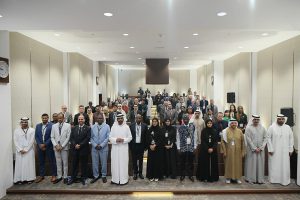ABU DHABI/WAM
The Abu Dhabi Agriculture and Food Safety Authority (ADAFSA) is hosting the 7th Annual Meeting of the Global Research and Expertise Network for Peste des Petits Ruminants (PPR-GREN) from January 20 to 22 2025.
The event brings together over 80 experts, researchers, and decision-makers from over 30 countries around the world to discuss strategies for controlling PPR and develop future initiatives that support sustainable development and global livestock protection.
This marks the first time the Middle East has hosted such an event, underscoring the UAE’s and Abu Dhabi’s commitment to supporting the implementation of the Global Programme for the Eradication of Peste des Petits Ruminants, in line with the strategies of the Food and Agriculture Organization of the United Nations (FAO) and the World Organisation for Animal Health (WOAH) by 2030.
The event highlights ADAFSA’s pioneering role in fostering international collaboration to combat animal diseases. The authority’s Camel Disease Reference Centre is intensifying its efforts to activate joint action among countries, research institutions, and reference centres to eradicate diseases that pose a direct threat to livestock and global food security.
The meeting features a distinguished group of experts, researchers, and officials from around the world, representing global reference centres and laboratories, including the Centre de Coopération Internationale en Recherche Agronomique pour le Développement (CIRAD) – France, the Pirbright Institute – United Kingdom, and the China Animal Health and Epidemiology Centre – China (CAHEC). Other participants include leading research institutions, universities, and representatives from regional organisations such as the European Union, the Gulf Cooperation Council (GCC), the African Union, and various NGOs, along with vaccine and diagnostic reagent manufacturers.
Over the course of three days, participants will discuss the latest scientific and knowledge-based developments related to PPR, including epidemiology, surveillance and diagnosis systems, vaccination programmes, and the integration of eradication strategies with other livestock disease control efforts. Innovations such as heat-resistant vaccines and advanced diagnosis techniques will also be showcased, contributing to global efforts to eradicate the disease.
Dr Arif Kalantar, Acting Executive Director of ADAFSA’s Development and Innovation Sector, expressed his pride in hosting the 7th Annual Meeting of PPR-GREN in Abu Dhabi, marking the first time such an event being held in the Middle East. He emphasised that this meeting serves as a vital platform to explore the latest scientific advancements and discuss innovative solutions to eradicate PPR by 2030, in line with the strategies of FAO and WOAH, thereby supporting food security at both local and global levels.
In his opening remarks, Dr Kalantar welcomed the experts, researchers, and international and regional organisations participating in the event. He highlighted that this gathering reflects ADAFSA’s and Abu Dhabi’s vision to enhance biosecurity and protect animal health as part of a comprehensive strategy to achieve food security.
He stated, “Abu Dhabi’s hosting of this international meeting underscores its leadership in scientific research and innovation. ADAFSA seeks to strengthen cooperation with various international institutions organisations and exchange knowledge with global experts and research centres to address animal diseases that threaten livestock and public health.”
Dr Arif also highlighted the achievements of ADAFSA’s Camel Disease Reference Centre and the Collaborating Centre for Quality Management System, including the unprecedented development of the world’s first test to measure the efficiency of serological analysis for PPR in camels. He explained that this breakthrough contributes to verifying methods for detecting antibodies to the PPR virus and determining the role of camels in transmitting the virus to small ruminants. These advancements contribute to serological surveys and the development of optimal control strategies while supporting global eradication efforts.
“We look forward to this event contributing to the development of innovative and sustainable solutions for animal diseases, building partnerships that enhance international efforts to protect livestock and achieve One Health, linking humans, animals, and the environment, thereby supporting food security at both local and global levels,” he added.
Participants in the meeting include leading universities, research institutions, civil society organisations, and private sector supporters. Notable attendees also include members of the PPR Advisory Committee and the Secretariat of the PPR-GREN.
 The Gulf Time Newspaper One of the finest business newspapers in the UAE brought to you by our professional writers and editors.
The Gulf Time Newspaper One of the finest business newspapers in the UAE brought to you by our professional writers and editors.
